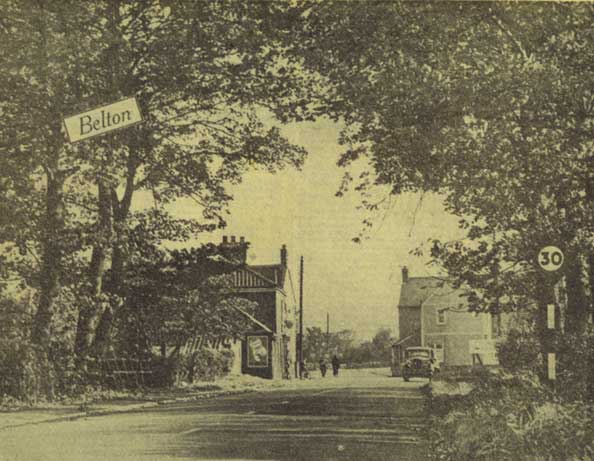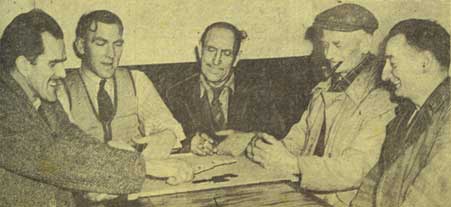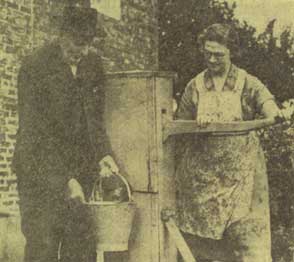|
Doncaster Chronicle.
Thursday 14th October 1954.
 Since it is unlikely that I shall
be returning to Belton for a week or two I feel it quite safe to
tell you that among the people from the surrounding villages the
place is known as Tommy's Town, and the reason for this has for some
considerable time caused much embarrassment to the local citizenry. The reason for this embarrassment is that the
local good people of Belton once hanged a sheep on a stealing charge
because it drank milk owned by a boy named Tommy.
I heard the story in the tap room of the Sir Solomon from Rupert Axe, John
Greensitt, Bill Caley, Charles Bowers and John Drakes who were enjoying a
quiet (?) game of dominoes slightly less than they were enjoying the
telling of the sheep's tale. Since it is unlikely that I shall
be returning to Belton for a week or two I feel it quite safe to
tell you that among the people from the surrounding villages the
place is known as Tommy's Town, and the reason for this has for some
considerable time caused much embarrassment to the local citizenry. The reason for this embarrassment is that the
local good people of Belton once hanged a sheep on a stealing charge
because it drank milk owned by a boy named Tommy.
I heard the story in the tap room of the Sir Solomon from Rupert Axe, John
Greensitt, Bill Caley, Charles Bowers and John Drakes who were enjoying a
quiet (?) game of dominoes slightly less than they were enjoying the
telling of the sheep's tale. But the story was not to be our only surprise. It was in Belton we met
90-year-old John William Wardle, a man as merry as his Dingley Dell
namesake ever was, who has a 54-year-old wife, a 21-year-old son, strong
view on dancing - "I like waltzes, quadrilles and the schottische"
- and spends his spare time in the garden.
But the story was not to be our only surprise. It was in Belton we met
90-year-old John William Wardle, a man as merry as his Dingley Dell
namesake ever was, who has a 54-year-old wife, a 21-year-old son, strong
view on dancing - "I like waltzes, quadrilles and the schottische"
- and spends his spare time in the garden.  “Wouldn’t dream of letting anyone else touch
it,” he said. “Been in agriculture since I was 8, and I intend to stay
in it as long a my legs will carry me.” Mr. Wardle who was once a farm foreman running
800 acres, nowadays specializes in Sweet Williams, Asters and Sweet Peas. Whereas Miss Doreen Arrand, a 16-year-old
nursemaid specializes in Belton, “I love the place. It might seem a
little sleepy spot to an outsider but I would not live anywhere else in
the country.” A view incidentally which is shared by her friend
shop assistant Margaret Fox and seems to point to a change in the
traditional way of things in which country girls cannot wait to leave
their villages for the bright lights of London.
I suppose the difference is now is that many country girls have already
seen London and decided sensibly enough that their own spot is far better. Next we met 83-year-old William Taylor of Cherry
Tree “Wouldn’t dream of letting anyone else touch
it,” he said. “Been in agriculture since I was 8, and I intend to stay
in it as long a my legs will carry me.” Mr. Wardle who was once a farm foreman running
800 acres, nowadays specializes in Sweet Williams, Asters and Sweet Peas. Whereas Miss Doreen Arrand, a 16-year-old
nursemaid specializes in Belton, “I love the place. It might seem a
little sleepy spot to an outsider but I would not live anywhere else in
the country.” A view incidentally which is shared by her friend
shop assistant Margaret Fox and seems to point to a change in the
traditional way of things in which country girls cannot wait to leave
their villages for the bright lights of London.
I suppose the difference is now is that many country girls have already
seen London and decided sensibly enough that their own spot is far better. Next we met 83-year-old William Taylor of Cherry
Tree House Farm, who still looks after his six-acre farm with every
evidence of content. "we don't run to big farms much in these
parts." Mr. Taylor explained, "This is probably one of the few
districts left where we still do strip farming." Mr. Taylor's great personal pride is that during
his lifetime he has held no fewer than 58 shooting licenses, and his
great sorrow is that he can no longer get about enough, nor find the time
to hunt as he would like to. It's a big blow," he confessed, "but
I've had to cut my shooting trips to one a week. Mr. Taylor reminisced awhile about the Belton
of his youth. "Remember when we used to have a coach here," he
recalled. "Used to call it the black Maria. When you wanted to get
out the driver gave you a candle to see your way down the steps." "But I can remember we had come grand sing-songs
on t'owd Maria. I've missed her a lot since she was broken up. House Farm, who still looks after his six-acre farm with every
evidence of content. "we don't run to big farms much in these
parts." Mr. Taylor explained, "This is probably one of the few
districts left where we still do strip farming." Mr. Taylor's great personal pride is that during
his lifetime he has held no fewer than 58 shooting licenses, and his
great sorrow is that he can no longer get about enough, nor find the time
to hunt as he would like to. It's a big blow," he confessed, "but
I've had to cut my shooting trips to one a week. Mr. Taylor reminisced awhile about the Belton
of his youth. "Remember when we used to have a coach here," he
recalled. "Used to call it the black Maria. When you wanted to get
out the driver gave you a candle to see your way down the steps." "But I can remember we had come grand sing-songs
on t'owd Maria. I've missed her a lot since she was broken up. Our next meeting was with Matilda who spews
flame, has a mouth full of pots and is looked after by a group of
schoolboys. At which point we hasten to point out that Matilda is a
pottery kiln. We met Matilda at the rear of Belton church school and
were formally introduced by assistant head Mr. T. F. Todd. Matilda was the brain child of Mr. R. Mawson and
Mr. A. Cooksey, two masters at the school. "We thought it might be instructive if we
built one for the older boys," the masters explained, "and it
has proved very popular. All our pottery is made from local clay and we
have had some very exiting results." Now the masters are hoping that the Education
authority will be keen enough on their idea to replace Matilda with an electric
kiln. "The snag is that we can not coax just those
few extra degrees of heat which would enable us to glaze our
pottery." The masters took us into a classroom to show some
examples of their work. Our advice to the appropriate education authority
is to open their purses and buy an electric kiln for Christmas for the
Belton potters. Our next meeting was with Matilda who spews
flame, has a mouth full of pots and is looked after by a group of
schoolboys. At which point we hasten to point out that Matilda is a
pottery kiln. We met Matilda at the rear of Belton church school and
were formally introduced by assistant head Mr. T. F. Todd. Matilda was the brain child of Mr. R. Mawson and
Mr. A. Cooksey, two masters at the school. "We thought it might be instructive if we
built one for the older boys," the masters explained, "and it
has proved very popular. All our pottery is made from local clay and we
have had some very exiting results." Now the masters are hoping that the Education
authority will be keen enough on their idea to replace Matilda with an electric
kiln. "The snag is that we can not coax just those
few extra degrees of heat which would enable us to glaze our
pottery." The masters took us into a classroom to show some
examples of their work. Our advice to the appropriate education authority
is to open their purses and buy an electric kiln for Christmas for the
Belton potters.
Story by Ian Skidmore, Pictures by Douglas Guest
|